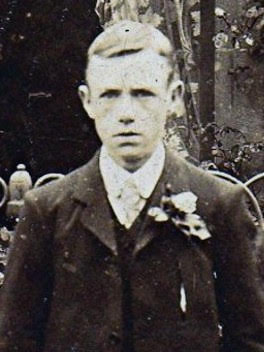Sjt
Charles Cecil Forster
Informatie over geboorte
|
Geboortedatum: 10/08/1888 |
|
Geboorteplaats: Great Orton, Cumberland, Engeland, Verenigd Koninkrijk |
Algemene Informatie
|
Beroep: Onderwijzer - Leerkracht |
Informatie legerdienst
|
Land: Engeland, Verenigd Koninkrijk |
|
Strijdmacht: British Expeditionary Force |
|
Rang: Serjeant |
|
Service nummer: 202243 |
|
Dienstneming plaats: Sunderland, Durham, Engeland, Verenigd Koninkrijk |
|
Eenheden: — Leicestershire Regiment, 2/4th Bn. (Laatst gekende eenheid) |
Informatie over overlijden
|
Datum van overlijden: 26/09/1917 |
|
Plaats van overlijden: Fokker Farm, België |
|
Doodsoorzaak: Killed in action (K.I.A.) |
|
Leeftijd: 29 |
Gedenkplaats
|
Tyne Cot Memorial Paneel: 50 |
Onderscheidingen en medailles 2
|
British War Medal Medaille — 02/06/1921 |
|
Victory Medal Medaille — 02/06/1921 |
Points of interest 2
| #1 | Geboorteplaats | ||
| #2 | Dienstneming plaats |
Mijn verhaal
Charles Cecil Forster was born in Great Orton, Cumberland. He was the fourth child of James and Elizabeth Ann. His father, James, was a teacher in Great Orton and in Calthwaite. Charles, as his father worked as a teacher, before enlisting. Charles married, his girlfriend, Eliza in 1917 a few months before he died. Eliza never remarried.
Charles served as a Serjeant with the Leicestershire Regiment, 2/4th Battalion, part of the 177th Brigade of the 59th (2nd North Midland) Division. This Battalion fought in the Battle of Polygon Wood, a phase in the Battle of Passchendaele. On 26 September 1917, the 2/4th, together with the 2/5th Leicester, led the attack. They were to establish a line between Fokker and Dochy Farm. The 2/4th and 2/5th Leicesters, were in support, and had to capture the second objective. The aim of the attack was to push the front line further east, in the direction of ‘s Graventafel. On the way the men had to take several farms, which had been turned into concrete strong points by the Germans.
At zero hour, 5.50 a.m. the Leicesters went over the top. Less than an hour later, at 6.20 a.m. the 2/4th Leicesters, on the left, had taken the first objective, suffering only light casualties. Though consolidation of the line proceeded under heavy shell fire. The allied barrage had been extremely effective and all the concrete emplacements along the Leicesters’ line had been destroyed. After the first objective had been consolidated the Lincolns pushed on, taking their objective with relative ease. Having met little opposition the Divisional commander, Major-General Romer, ordered the Lincolns to capture Riverside and Otto Farm. Both objectives were captured, but the impulsive attack hadn’t been well prepared. The allied artillery barrage was dropping short, causing several casualties amongst the Lincolns. And the 2/4th and 2/5th were forced to abandon Riverside and Otto Farm. In the meantime the German artillery kept on shelling the positions of the 2/4th Leicesters and casualties were mounting up. Notwithstanding the heavy shelling the Leicesters held their positions till they were relieved on the 27th September. Though the attack had been a success, the 2/4th Leicesters had suffered heavy casualties, due to persistent German artillery fire.
Serjeant Charles Cecil Forster was killed in action on 26 September 1917. The twenty-nine-year-old was possibly killed due to shell fire while holding the line near Fokker Farm. Charles has no known grave and is remembered on the Tyne Cot Memorial.
Charles served as a Serjeant with the Leicestershire Regiment, 2/4th Battalion, part of the 177th Brigade of the 59th (2nd North Midland) Division. This Battalion fought in the Battle of Polygon Wood, a phase in the Battle of Passchendaele. On 26 September 1917, the 2/4th, together with the 2/5th Leicester, led the attack. They were to establish a line between Fokker and Dochy Farm. The 2/4th and 2/5th Leicesters, were in support, and had to capture the second objective. The aim of the attack was to push the front line further east, in the direction of ‘s Graventafel. On the way the men had to take several farms, which had been turned into concrete strong points by the Germans.
At zero hour, 5.50 a.m. the Leicesters went over the top. Less than an hour later, at 6.20 a.m. the 2/4th Leicesters, on the left, had taken the first objective, suffering only light casualties. Though consolidation of the line proceeded under heavy shell fire. The allied barrage had been extremely effective and all the concrete emplacements along the Leicesters’ line had been destroyed. After the first objective had been consolidated the Lincolns pushed on, taking their objective with relative ease. Having met little opposition the Divisional commander, Major-General Romer, ordered the Lincolns to capture Riverside and Otto Farm. Both objectives were captured, but the impulsive attack hadn’t been well prepared. The allied artillery barrage was dropping short, causing several casualties amongst the Lincolns. And the 2/4th and 2/5th were forced to abandon Riverside and Otto Farm. In the meantime the German artillery kept on shelling the positions of the 2/4th Leicesters and casualties were mounting up. Notwithstanding the heavy shelling the Leicesters held their positions till they were relieved on the 27th September. Though the attack had been a success, the 2/4th Leicesters had suffered heavy casualties, due to persistent German artillery fire.
Serjeant Charles Cecil Forster was killed in action on 26 September 1917. The twenty-nine-year-old was possibly killed due to shell fire while holding the line near Fokker Farm. Charles has no known grave and is remembered on the Tyne Cot Memorial.
Bronnen 3
|
2/4 Battalion Leicestershire Regiment. (The National Archives, KEW (TNA), WO 95/3022/4). https://discovery.nationalarchives.gov.uk/details/r/C14303 Verdere verwijzing |
|
McCarthy C., Passchendaele. The Day-by-Day Account, (London, Uniform, 2018), p. 96-97. Gebruikte bronnen |
|
Trinity School War Memorial https://www.trinity.cumbria.sch.uk/warmemorials/charles-cecil-forster/ Gebruikte bronnen |
Meer informatie 3
|
Commonwealth War Graves Commission Database https://www.cwgc.org/find-records/find-war-dead/casualty-details/1632231 |
|
Namenlijst (In Flanders Fields Museum) https://namenlijst.org/publicsearch/#/person/_id=0ec87b4a-c33d-4bfc-8eb5-0de1298cbd52 |
|
Lives of the First World War (Imperial War Museum) https://livesofthefirstworldwar.iwm.org.uk/lifestory/2513090 |
